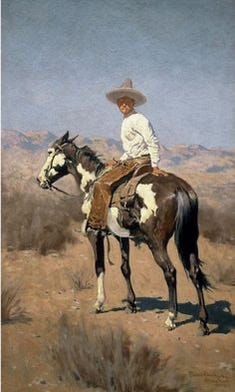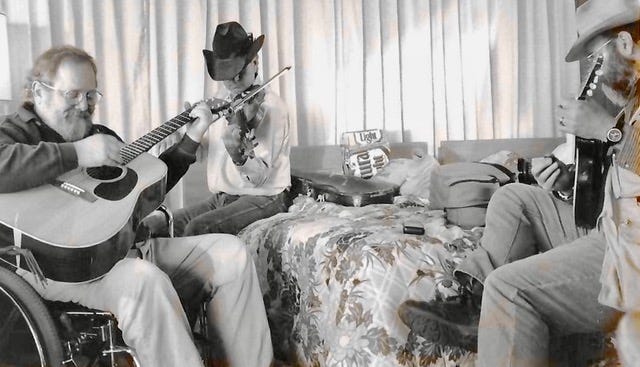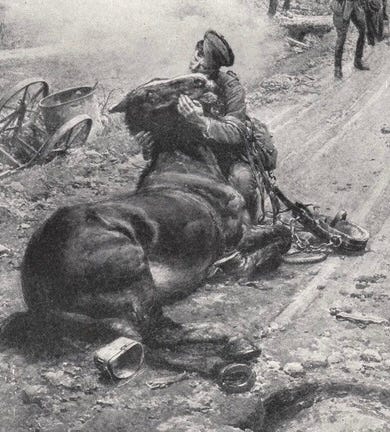“Goodbye, Old Paint,” is one of the most popular traditional cowboy songs of all time. There are many versions and variations, but my reworking focuses on the sadness of losing a beloved horse. In my mind, “paint” is merely one letter away from “pain,” and grief is an old pain most of us know well. Listen Here:The first Cowboy Poetry GatheringIt took nearly five years to plan and execute the first Cowboy Poetry Gathering, held in Elko, Nevada, January 1985. During that time, a team of wonderful people (folklorists, cowboys and local Elko folks) worked together to make it happen. The first step was the big job of going out to ranching country all over the West in search of men and women who wrote or recited poetry created from experience. That job took folklorists and other fieldworkers driving way out on dirt roads in the outback visiting folks to document their art and also to build trust. It was a new and bold idea. We planned a one-time event and never imagined it would catch on. But it touched a chord. This January will celebrate the Gathering’s 40th year. Most of the invited artists had never met that first year. We arranged to get the out-of-town folks to Salt Lake City where they would catch a train to Elko and we trusted that they would discover common ground by the time they pulled into the station. Our guests hailed from Montana, Texas, North Dakota, New Mexico, and in fact from all over the ranching West. Their common thread was that they all knew horses and cattle and made their livings in wide-open spaces. When we sat down to plan the program, we first laid out sessions by state of origin and then we organized additional sessions around a theme. One was “Good Horses and Bad Rides.” We reviewed dozens, maybe even hundreds of poems, and then we invited half-a-dozen folks to gather on stage. Every poet in that session shared at least one poem about the death of a favorite horse. The first recitations were poignantly awkward. Ranch people pride themselves on stoicism, but these losses were deeply felt and many of the poems were delivered with quavery voices and shaking knees. People who work the land are incisive critics when it comes to authenticity, and these poems passed the test. We watched in real time as the poets gave each other permission to fully experience the impact of losing a beloved four-legged partner and friend. As the poets bonded with each other, they also bonded with the audience, whose members were, for the most part, cow people themselves. The stories were as true as they were vulnerable, and they modeled a new way of talking about the existential truths of this rare way of life. As I watched and listened, I knew we had to find a way to continue this work. The History of “Goodbye Old Paint”We don’t know for sure where this song originated. Many people claimed authorship, and versions were collected from Texas to Wyoming. To my surprise, when I looked at Wikipedia to see what they had to say about it, they cited me as a primary source, based on a feature I produced with my radio partner, Taki Telonidis, for NPR in 2010. The piece tells the story of Charlie Willis, one of the three old-time cowboy singers I have dedicated this album to, and about a seven-year-old boy, Jess Morris, who remembered the song that Willis, a cowboy and former slave who worked on his family ranch, taught to him. Charlie Willis may have made up the song up himself, or just passed it along. We have no way to know. Nor do we know how much the version Morris sang decades later into John Lomax‘s big field recorder resembled the version he first learned from Charlie. You can listen to this NPR feature here: CLICK HERE Enduring SongsWhy do some songs endure, such as “Goodbye Old Paint?” For some songs, it's all about the singer who delivers the song. But particularly with folk songs, songs not neccesarily fueled by showmanship, money or power, it’s not that. There is something intrinsic in the song that continues to speak to people. It’s almost as though the music and words have a spirit of their own. You might expect that the most famous cowboy folk song about a horse would be about a mythical steed or an animal who accomplished heroic deeds, but Old Paint is not that horse. She is flawed by only being able to “pace when she can.” Even being a Paint horse, a spotted animal, is controversial in the world of horse colors. Also, the verses don’t quite make sense. Half the song is about the cowboy and his love life. And yet, there is something magical. What is it? I’ve been thinking back to animals where I’ve mourned their loss. None were perfect. But something about them made me love them, anyway. Unlike cowboys and many other occupations from the past that relied on true horse-power, I have never experienced an animal that worked with me daily and could save my life. In this song, we never know the details of this specific Old Paint. The song's power lies in the mystery of what is left unsaid. Thanks to my old friend Waddie Mitchell for helping me understand this. My RecordingThe song starts out with harmonium, inflected with a bit of synthesizer. My voice floats over the drone. Then a bass clarinet joins the fray, played beautifully by Deborah Robins, adapting the theme that the original fiddler Jess Morris played in his 1947 recording. Jon Neufeldt adds some lovely guitar backup while I hold down the basic waltz time rhythm. The words having done their job, I improvise a closing theme on the mandola. “Old Pain,” LyricsFarewell fair ladies, I’m leaving Cheyenne Farewell fair ladies, I’m leaving Cheyenne Old Paint’s a good pony, she paces when she can Old Paint, Old pain, I’m leaving Cheyenne Goodbye my loyal pony, we’re off to Montan Old Paints a good pony, she paces when she can We set down our blankets on the green grassy ground And the horses and the cattle are a’ grazin’ all around Green fields and sunlight and water all around The pains are forgotten when we are heaven bound These tears cannot measure my love for Old Paint Or count up the years with nary complaint Does a horse go to heaven, I asked it in a prayer I didn’t get no answer but seems it’s only fair You're currently a free subscriber to Loose Cannon Boost. For the full experience, upgrade your subscription. |
“Old Pain” a new song from Cowboy Sutra
10:11
0




